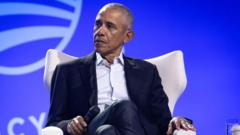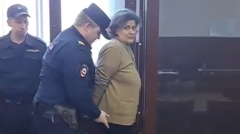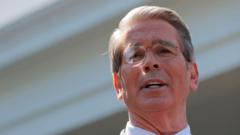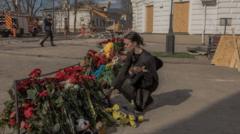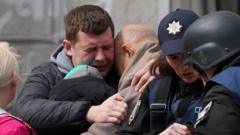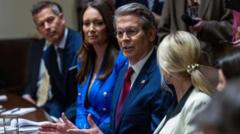Former President Donald Trump has once again pointed fingers at Ukrainian President Volodymyr Zelensky for the continuation of war following a catastrophic missile attack by Russia that left 35 civilians dead and over 100 injured in Sumy. During a White House statement, Trump asserted that Zelensky shares the blame with Russian President Vladimir Putin for the casualties that he termed "millions," a claim widely disputed. This criticism came on the heels of intensified violence in Ukraine, specifically Moscow’s strike on Sumy, characterized as the deadliest of the year.
Trump Assigns Blame to Zelensky After Deadly Russian Assault in Ukraine
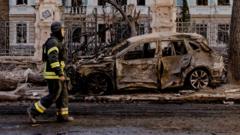
Trump Assigns Blame to Zelensky After Deadly Russian Assault in Ukraine
In the wake of a devastating attack on Ukrainian civilians, Trump places responsibility on Ukraine's leader while calling for accountability among world leaders.
In his remarks, Trump argued that initiating conflict against a significantly larger adversary is unwise, alluding to Ukraine’s military requests for assistance while asserting that the leadership of both Zelensky and Biden has failed to avert tragedy. Trump characterized the situation as a collective failure of leadership, emphasizing that "Biden could have stopped it and Zelensky could have stopped it, and Putin should have never started it."
This denunciation marks a departure from the unified response of NATO, where leaders such as Secretary General Mark Rutte expressed solidarity with Ukraine, condemning Russia as the clear aggressor. Distinctly contrasting their positions, Trump has been noted for seeking rapprochement with Moscow, suggesting he could bridge negotiations and hinting at favorable discussions with Putin, despite the ongoing violence and loss of life.
Further complicating the landscape, Zelensky’s government responded to rising civilian casualties by dismissing local officials, holding them accountable for events leading up to the attack, including a medal ceremony that coincided with the Russian strike. The ongoing conflict, traced back to Russia’s 2014 annexation of Crimea and support for armed insurgents, still casts a shadow over the region as both diplomatic efforts and military escalations continue.
In the U.S., discussions surrounding the war often lead to contentious divisions among political leaders and factions, as demonstrated by Trump's blame-shifting from Russia to Ukraine's leadership. Meanwhile, experts and officials in both Ukraine and the West call attention to the urgent need for a unified approach towards addressing the longstanding conflict. By placing blame across political lines, Trump's statements may further complicate international diplomatic efforts as leaders grapple with the quest for peace in a region fraught with aggression and instability.
The situation in Ukraine remains increasingly volatile as the world watches to see how political dynamics evolve amidst ongoing military actions.
This denunciation marks a departure from the unified response of NATO, where leaders such as Secretary General Mark Rutte expressed solidarity with Ukraine, condemning Russia as the clear aggressor. Distinctly contrasting their positions, Trump has been noted for seeking rapprochement with Moscow, suggesting he could bridge negotiations and hinting at favorable discussions with Putin, despite the ongoing violence and loss of life.
Further complicating the landscape, Zelensky’s government responded to rising civilian casualties by dismissing local officials, holding them accountable for events leading up to the attack, including a medal ceremony that coincided with the Russian strike. The ongoing conflict, traced back to Russia’s 2014 annexation of Crimea and support for armed insurgents, still casts a shadow over the region as both diplomatic efforts and military escalations continue.
In the U.S., discussions surrounding the war often lead to contentious divisions among political leaders and factions, as demonstrated by Trump's blame-shifting from Russia to Ukraine's leadership. Meanwhile, experts and officials in both Ukraine and the West call attention to the urgent need for a unified approach towards addressing the longstanding conflict. By placing blame across political lines, Trump's statements may further complicate international diplomatic efforts as leaders grapple with the quest for peace in a region fraught with aggression and instability.
The situation in Ukraine remains increasingly volatile as the world watches to see how political dynamics evolve amidst ongoing military actions.







